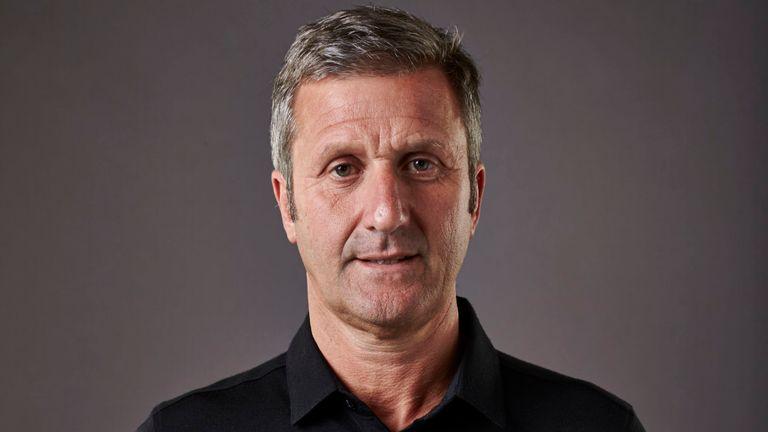- News
- Reviews
- Bikes
- Components
- Bar tape & grips
- Bottom brackets
- Brake & gear cables
- Brake & STI levers
- Brake pads & spares
- Brakes
- Cassettes & freewheels
- Chains
- Chainsets & chainrings
- Derailleurs - front
- Derailleurs - rear
- Forks
- Gear levers & shifters
- Groupsets
- Handlebars & extensions
- Headsets
- Hubs
- Inner tubes
- Pedals
- Quick releases & skewers
- Saddles
- Seatposts
- Stems
- Wheels
- Tyres
- Tubeless valves
- Accessories
- Accessories - misc
- Computer mounts
- Bags
- Bar ends
- Bike bags & cases
- Bottle cages
- Bottles
- Cameras
- Car racks
- Child seats
- Computers
- Glasses
- GPS units
- Helmets
- Lights - front
- Lights - rear
- Lights - sets
- Locks
- Mirrors
- Mudguards
- Racks
- Pumps & CO2 inflators
- Puncture kits
- Reflectives
- Smart watches
- Stands and racks
- Trailers
- Clothing
- Health, fitness and nutrition
- Tools and workshop
- Miscellaneous
- Buyers Guides
- Features
- Forum
- Recommends
- Podcast
news
 Dr Richard Freeman (picture credit Team Sky)
Dr Richard Freeman (picture credit Team Sky)Dr Richard Freeman hearing goes private to protect Team Sky and GB riders' blood value data
Today's session of the Medical Practitioners Tribunal Service hearing into Dr Richard Freeman’s fitness to practise was held in private – to protect blood test data relating to riders from Team Sky and the Great Britain Cycling Team from being released into the public domain.
The Guardian reports that the tribunal, which began in February 2019, has now been adjourned until next Thursday. The hearing is scheduled to run until 26 November, but the newspaper says that it may not now conclude until Easter next year.
That is because Mary O’Rourke, the Queen’s Counsel defending Freeman, who has admitted all but four of the 22 charges brought against him by the General Medical Council, has another case scheduled in the interim.
Freeman has admitted ordering Testogel testosterone patches to be delivered to the National Cycling Centre in Manchester in 2011, but denies that he did so “knowing or believing it was to be used by an athlete to improve performance.”
Instead, he claims he was bullied into ordering them by former British Cycling and Team Sky coach Shane Sutton, alleging that he was suffering from an erectile dysfunction – something the Australian vehemently denies.
The request to hold today’s session in private was reportedly made at the request of both British Cycling and Team Sky, and the week’s adjournment of the case is said to be to allow a protocol to be drawn up to protect the anonymity of individual riders.
Latest Comments
- imajez 25 min 19 sec ago
- looks like someone has fallen for the steel is real markerting BS. I only care how a bike rides, not what it is made of. I had a lovely steel...
- lonpfrb 1 hour 45 min ago
That argument is ignorance of the widespread height and width restrictions to be found on the many minor roads that were originally created for...
- David9694 4 hours 1 min ago
cyclists should be made to have number plates - Interesting police video here of the range of illegal number plates - we'd got, as the caption says...
- rookybiker 5 hours 14 min ago
The trailer seems to connect to both ends of the rear axle. Can it do tight corners without dragging the tyre sideways?
- froze 5 hours 17 min ago
Motorists have always been unkind to cyclists, but distracted driving is adding to the problem....
- Destroyer666 6 hours 10 min ago
Have you owned Bont shoes? In my experience even the widest Lake shoes have had a bizarre form of narrowing way too much in the toe area. But the...
- froze 6 hours 38 min ago
Not sure if this is possible, but this news letter goes out all over the world, and some places like Decathlon does not send stuff to America, in...
- Hirsute 7 hours 23 min ago
I'm confused as to why you'd need bib shorts indoors.
- Oldfatgit 7 hours 51 min ago
I'm sure you were being sarcastic... however ... Lewis Hamilton lives in Monaco. Yet another car driver that doesn't pay any tax
Add new comment
1 comments
Medical research has recognised that a male athlete’s blood levels of testosterone, white blood cells and red cell become depleted after prolonged exercise and when fatigue sets in. Therefore, the sportsdoctor “keeps the rider healthy” by restoring these levels. This is the basis of the argument that David Millar explains in his book ‘Racing through the dark’.
It is not surprising that any sports team would need a medical specialist who knows about this and how to administer medication without going outside the rules or getting caught. Don’t think for one moment that Team Sky’s marginal gains research didn’t look at the interpretation of the rules as well as the science of cycling. Then they needed to find someone who was either A: a fully skilled and knowledgeable medical expert who could do what was necessary or B: a medical expert who was carelss and could be made a scapegoat. Step forward Dr Freeman.